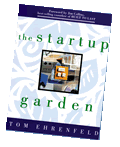
Just Managing: Building EvidenceDigital Paper CEO John Cronin shares his philosophy on how to build a successful company. Apr 06 2001 01:50 PM PDT If John Cronin were to write a business book, he'd call it "Building Evidence." The 30-year-old CEO of Digital Paper (dossier) believes that the secret to his company's success lies in his practice of basing all decisions on clear and direct proof that something is working. "You get to the next step with the business only after you've built the evidence that you can actually get there," he says. "Most customers don't buy concepts." Evidence translates to customers who buy products and services, Cronin says. His company's shareholders, who invested because of the cash the company generates rather than its promise to create insanely great wealth in the digital economy, clearly believe in hard proof, as well. Digital Paper is succeeding today because the seeds of the company's success were laid prior to the market slowdown. The company might be a brainchild of the Internet, yet its core business practices are decidedly old-economy. Digital Paper, which converts complex technical documents, such as engineering blueprints into digital files so that clients can manage them online, has grown steadily since 1996. During the past year, the company scored more than $24 million in venture money. It has 72 employees and last year did more than $5 million in sales. It has been growing at a rate of 100 percent annually for the past four years. Cronin says Digital Paper is reaping the success it sowed through the early days of bootstrapping its growth, dealing intimately with customers and learning about its market. The infusion of venture capital will help the company scale its existing profitable model - in contrast to all the money thrown at pie-eyed schemes during the height of the Internet boom. As the company has grown, Cronin and his colleagues have stayed rooted in the nuances of the market, never trying to expand their product into random markets. Like many major players such as Hewlett-Packard (HWP) or Sony (SNE), Cronin started his company with a simple mission instead of a product. Having worked in the engineering trade, Cronin was frustrated by kinks in the work process, and he went solo with a simple premise. "I would focus on the way people worked and how they get work done - and try to find simple ways to implement things in a more effective manner," he says. He hung out a shingle for his consulting company, Strategic Working Solutions, in May 1995. While advising the enterprise document-management steering committee for the Florida department of transportation, Cronin had an epiphany. He'd been tracking the emergence of the Internet, and in one of those "pull the car off the road and write it all down" moments, he envisioned helping clients by digitizing documents, sending them over the Net and printing them on the other end. He figured his model could reduce the hassle of packing up and shipping cumbersome papers, and improve efficiency. Cronin initially approached a local company to develop the product, but when they scoffed at the promise of the Internet, he ended up hiring one of their employees on a consulting basis. That person eventually joined Cronin as a partner. From 1996 to 1999, the two built the company by following the simple path of devoting themselves to learning their customers' needs. Cronin didn't get distracted by seeking outside financing; instead, he chose to focus solely on the activities that generated cash from Digital Paper customers. Whenever a problem with a customer arose, Cronin would immediately get on a plane to meet with them - always shifting the conversation from flaws in the product to the customers' needs that were not being met. This applied-learning mode helped him move up the food chain with customers, winning subsequent sales while funding the R&D of the evolving product. He raised serious venture money only toward the end of last year, when he felt that the company was ready to grow. Cronin believes that the current market climate was advantageous for his company because Digital Paper had a proven model, so he didn't need to persuade his suitors of the company's potential. In fact, he had different investors competing for the best deals. Today the company has more than 250 clients, including blue-chip players like UPS, Eastman Kodak (EK) and Boeing (BA). Cronin says the key to his company's success has little to do with its killer application. "At the end of the day, I am a technology cynic," he says, "because it's really about your people and how well you are solving the problems for your customers." This is the last Just Managing column I'll be writing, as I am focusing my time on completing my first book, titled "The Startup Garden: How Growing a Business Grows You," to be published later this year from McGraw-Hill. I want to thank everyone who has helped me with the column. If you'd like information on the book as it progresses, please send an e-mail. |
THE BOOK Read or print the Intro and Chapter 1. Read the book reviews at Inc and 1-800-CEO-READ. Read the publisher's press release. Buy this book from Amazon.com. Visit the companies that Tom discusses in the book Hear a recent lecture by Tom on the Startup Garden STARTUP KIT Buy my book and I will send you a worksheet and list of local and industry resources for your startup. Simply send me an email with your zip code and type of company and I will email you the free kit. Thanks! TOM'S WRITING Just Managing – articles that Tom wrote for The Industry Standard and some Business Articles written for Inc., Fortune Small Business, Harvard Management Update, and other places. RESOURCES Read about other books and web sites about starting your own business. |
| © 2001-2003 Tom Ehrenfeld | Site design by Tim Swan | |
